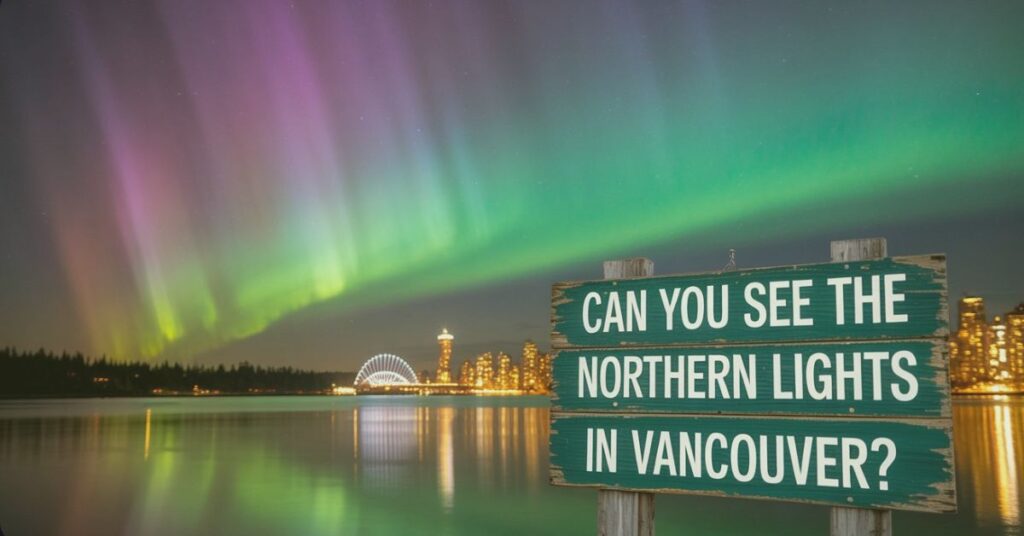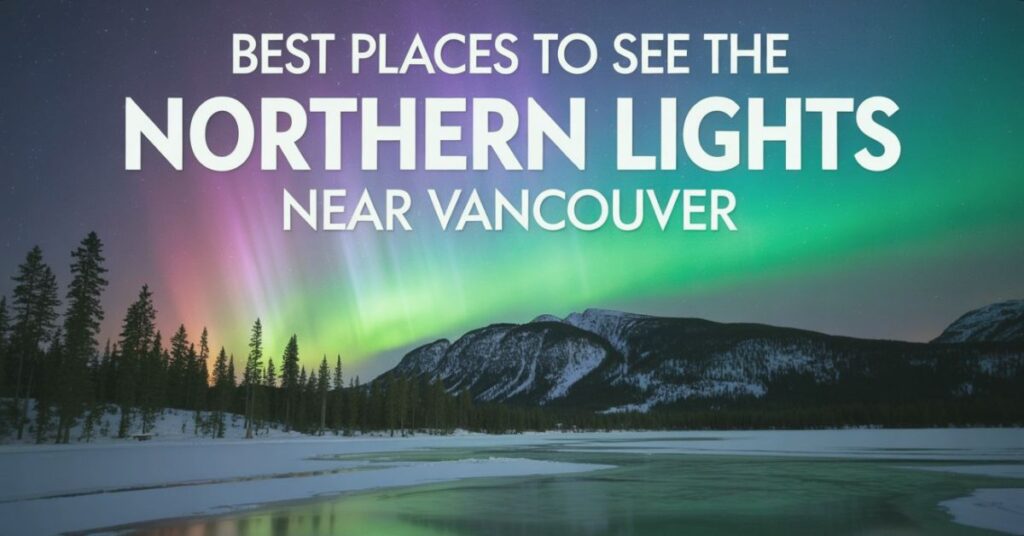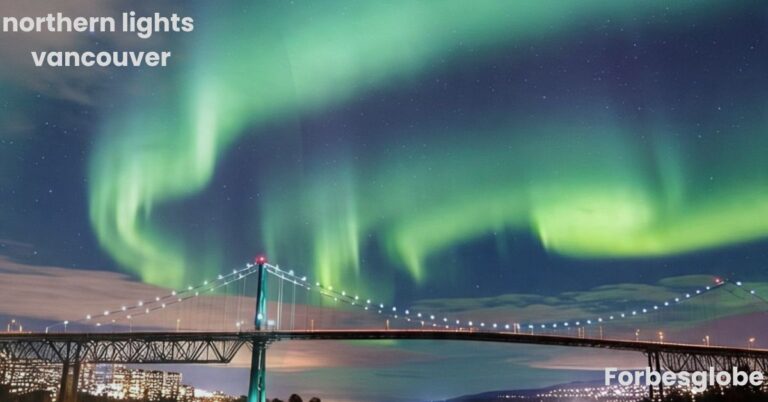Dreaming of seeing the Northern Lights Vancouver? While this stunning natural light show is more commonly associated with Arctic destinations, it’s possible to witness the aurora borealis in British Columbia during strong geomagnetic storms.
Vancouver’s unique coastal landscape, combined with dark-sky locations nearby, offers rare but rewarding opportunities to experience the dancing lights in person. Whether you’re an avid skywatcher or a first-time aurora chaser, knowing where and when to look is essential.
In this guide, we’ll explore the best times, viewing spots, and expert tips to catch a glimpse of this celestial phenomenon and experience one of nature’s most magical displays near the city.
What Are the Northern Lights?
The Northern Lights are created when charged particles from the sun collide with gases in Earth’s atmosphere. These collisions produce bursts of light that can appear as glowing curtains, arcs, or ripples in the night sky. The most common colors are green, purple, and pink, though red and blue auroras can also occur during intense geomagnetic storms.
Can You See the Northern Lights in Vancouver?

Yes—but only under the right conditions. Vancouver lies below the Arctic Circle, making aurora sightings less frequent compared to cities further north. However, during periods of heightened solar activity, particularly when a solar flare or coronal mass ejection (CME) reaches Earth, the auroral oval can expand far enough south to make auroras visible over Vancouver and the Lower Mainland.
In recent years, especially during the solar maximum of Solar Cycle 25 (2024–2025), more auroras have been spotted from this region than ever before.
What Is the Kp Index and Why Does It Matter?
The Kp Index is a scale from 0 to 9 that measures geomagnetic activity. The higher the Kp number, the further south the auroras can be seen.
- Kp 4-5: Northern parts of British Columbia may see auroras.
- Kp 6-7: Possibility of auroras from Vancouver or Victoria.
- Kp 8-9: High likelihood of visibility across southern BC, even in areas with light pollution.
You can track the Kp Index in real-time using resources like:
- AuroraWatch Canada
- NOAA Space Weather Prediction Center
- Aurora Forecast Apps (My Aurora Forecast, SpaceWeatherLive)
Best Time to See the Northern Lights in Vancouver
Catching a glimpse of the aurora in Vancouver is about timing, weather, and luck. Here’s how to improve your chances:
Season
- Best viewed between September and March.
- The long, dark nights of winter are ideal, though fall and early spring can also provide clear skies.
Time of Night
- Peak viewing hours are between 10 PM and 2 AM.
- During strong geomagnetic storms, auroras may be visible earlier in the evening or persist later into the night.
Sky Conditions
- You need clear skies and low humidity for optimal visibility.
- Avoid nights with cloud cover or a full moon, which can reduce contrast.
Best Places to See the Northern Lights Near Vancouver

To improve your odds, head to dark-sky locations away from city lights. Here are some top spots that Vancouver locals and photographers recommend:
Cypress Mountain Lookout (West Vancouver)
- Just 30 minutes from downtown.
- Offers elevated, panoramic views of the city and the northern sky.
- Popular with stargazers and night photographers.
Porteau Cove Provincial Park
- Located on the Sea-to-Sky Highway.
- Beautiful oceanfront views with minimal light pollution.
- Often used for night sky photography, including meteor showers and auroras.
Mount Seymour Provincial Park
- Great elevation and fewer artificial lights.
- Dress warmly—temperatures can drop quickly at night.
Golden Ears Provincial Park
- Roughly 1.5 hours from downtown Vancouver.
- Remote, mountainous terrain with truly dark skies—perfect for serious aurora hunters.
Boundary Bay Regional Park (Delta)
- Located to the south of Vancouver.
- Provides wide open views of the northern sky across water and fields.
Brackendale (Near Squamish)
- An hour from Vancouver, and a favorite spot for bird watchers and nature lovers.
- Offers north-facing mountain views, ideal for aurora spotting during strong activity.
Photography Tips for Capturing the Aurora in Vancouver
Even when the lights are faint, a camera can see what the human eye might miss. Here are essential tips for photographing auroras:
- Use a DSLR or mirrorless camera with manual mode.
- Set a long exposure (10–30 seconds).
- Use a tripod to prevent blur.
- Choose a wide aperture (f/2.8 or lower).
- Set ISO between 800–3200 depending on conditions.
- Manually focus on a bright star or distant light.
Apps and Tools to Track the Northern Lights
Want to be among the first to know when the lights are active? These tools can help:
- My Aurora Forecast & Alerts (iOS/Android): Real-time Kp index alerts.
- AuroraWatch Canada: Aurora alerts for Canada with a 30-minute lead.
- NOAA Aurora Forecast: Scientific forecast maps and solar data.
- SpaceWeatherLive.com: Great for advanced tracking and solar activity updates.
Real Stories: Recent Aurora Sightings in Vancouver
In May 2024, a major geomagnetic storm (Kp 8.5) created dazzling aurora displays visible across the Lower Mainland, Vancouver Island, and even Seattle. Social media flooded with photos showing green and purple waves over the Lions Gate Bridge, Stanley Park, and the North Shore mountains.
Such events are rare—but they’re becoming more frequent as we approach solar maximum. It’s the perfect time to stay informed and be ready.
FAQs
How often can you see the Northern Lights in Vancouver?
Only a few times a year, usually during strong geomagnetic storms. Average years may see 1–3 visible events.
Can you see the aurora from downtown Vancouver?
It’s possible, but very difficult due to light pollution. Head to darker areas for better chances.
Do I need special equipment?
No, but a good camera will capture more than the eye can see. Dress warmly and bring a flashlight with red light mode.
Are there tours for Northern Lights near Vancouver?
Not usually, as sightings are unpredictable. However, guided photography and stargazing events are sometimes offered in dark-sky parks nearby.
What is the best place to see the Northern Lights near Vancouver?
Cypress Mountain Lookout is one of the best places near Vancouver to view the Northern Lights due to its elevation and dark skies.
Conclusion:
Absolutely! While you won’t see auroras nightly in Vancouver, when conditions are right, the experience is magical and unforgettable. The key is being prepared—know where to go, how to check forecasts, and bring the right gear.
With solar activity increasing in 2025, your chances of seeing the Northern Lights in Vancouver are better than ever. Whether you’re a photographer, stargazer, or simply curious, don’t miss your chance to witness one of nature’s most awe-inspiring displays—right from British Columbia’s backyard.
Also Read:
Zak Doffman: Cybersecurity Analyst, Forbes Journalist, and Leading Voice on Digital Privacy
Strands Hints: A Complete Guide to Mastering the NYT Puzzle Game
Billy Bambrough: A Comprehensive Overview of His Impact on Cryptocurrency Journalism

